Panamanian opposition politicians have accused the US of launching a “camouflaged invasion” of the country, amid simmering discontent over the government’s handling of the diplomatic crisis.
After a three-day visit by the US Secretary of Defense Pete Hegseth, US President Donald Trump appeared to confirm that US military personnel had been deployed to the Central American country on Thursday, telling reporters: “We’ve moved a lot of troops to Panama.”
Hegseth said that the US would increase its military presence at three former US bases in the country to “secure the Panama Canal from Chinese influence.”

Photo: AFP
The last US military bases in Panama were vacated in 1999 as a condition of the 1977 Torrijos-Carter treaties to hand the canal to Panamanian ownership. Under the canal’s neutrality treaty, no foreign power can “maintain military forces, defense sites and military installations within its national territory.”
“This is a camouflaged invasion,” said Ricardo Lombana, the leader of the opposition Other Way Movement. “An invasion without firing a shot, but with a cudgel and threats.”
At a news conference on Wednesday to announce the signing of a memorandum of understanding (MOU) with the US, Panamanian Minister of Public Security Frank Abrego said the agreement would not impinge on his nation’s sovereignty and the country would not accept military bases.
However, a full text of the MOU included aerial photos of Fort Sherman, Rodman Naval Base and Howard Air Force Base, with areas outlined for “training,” “humanitarian activities” and the “installation of US property.”
The Panamanian government said they are not “military bases” and that the deal is temporary, but opposition parties have rejected such claims.
“If you have an installation which is for the use of foreign soldiers and they have control over what happens inside — and Panama has to ask in advance to enter — that’s a military base,” Lombana said.
For many Panamanians, the return of US armed forces — even for supposed “joint operations” — would bring back uncomfortable memories of 1989’s Operation Just Cause, when US troops killed thousands of civilians.
A second agreement allows US Navy ships to be reimbursed for the fees they pay to the canal.
That preferential treatment would appear to contravene the neutrality treatment and could open the door to further attempts to negotiate down the fees charged by the canal.
On Thursday, a local lawyer filed a legal case against the Panamanian President Jose Raul Mulino, accusing him of “crimes against the international personality of the state.”
Frustration is growing over the government’s handling of the diplomatic crisis. Since Trump declared his plan to “take back” the Panama Canal in his Jan. 20 inauguration speech, all communication on the topic has been through Mulino and the details of negotiations kept largely secret.
This has led to serious differences in the US and Panamanian accounts of those negotiations.
US Secretary of State Marco Rubio visited in early February, Mulino told reporters that the meeting had been “very cordial” and that the canal was not under threat.
However, Rubio said the situation around the canal was “unacceptable” and Trump continued to call for the return of the canal.

POLITICAL PATRIARCHS: Recent clashes between Thailand and Cambodia are driven by an escalating feud between rival political families, analysts say The dispute over Thailand and Cambodia’s contested border, which dates back more than a century to disagreements over colonial-era maps, has broken into conflict before. However, the most recent clashes, which erupted on Thursday, have been fueled by another factor: a bitter feud between two powerful political patriarchs. Cambodian Senate President and former prime minister Hun Sen, 72, and former Thai prime minister Thaksin Shinawatra, 76, were once such close friends that they reportedly called one another brothers. Hun Sen has, over the years, supported Thaksin’s family during their long-running power struggle with Thailand’s military. Thaksin and his sister Yingluck stayed

Kemal Ozdemir looked up at the bare peaks of Mount Cilo in Turkey’s Kurdish majority southeast. “There were glaciers 10 years ago,” he recalled under a cloudless sky. A mountain guide for 15 years, Ozdemir then turned toward the torrent carrying dozens of blocks of ice below a slope covered with grass and rocks — a sign of glacier loss being exacerbated by global warming. “You can see that there are quite a few pieces of glacier in the water right now ... the reason why the waterfalls flow lushly actually shows us how fast the ice is melting,” he said.

FOREST SITE: A rescue helicopter spotted the burning fuselage of the plane in a forested area, with rescue personnel saying they saw no evidence of survivors A passenger plane carrying nearly 50 people crashed yesterday in a remote spot in Russia’s far eastern region of Amur, with no immediate signs of survivors, authorities said. The aircraft, a twin-propeller Antonov-24 operated by Angara Airlines, was headed to the town of Tynda from the city of Blagoveshchensk when it disappeared from radar at about 1pm. A rescue helicopter later spotted the burning fuselage of the plane on a forested mountain slope about 16km from Tynda. Videos published by Russian investigators showed what appeared to be columns of smoke billowing from the wreckage of the plane in a dense, forested area. Rescuers in

‘ARBITRARY’ CASE: Former DR Congo president Joseph Kabila has maintained his innocence and called the country’s courts an instrument of oppression Former Democratic Republic of the Congo (DR Congo) president Joseph Kabila went on trial in absentia on Friday on charges including treason over alleged support for Rwanda-backed militants, an AFP reporter at the court said. Kabila, who has lived outside the DR Congo for two years, stands accused at a military court of plotting to overthrow the government of Congolese President Felix Tshisekedi — a charge that could yield a death sentence. He also faces charges including homicide, torture and rape linked to the anti-government force M23, the charge sheet said. Other charges include “taking part in an insurrection movement,” “crime against the